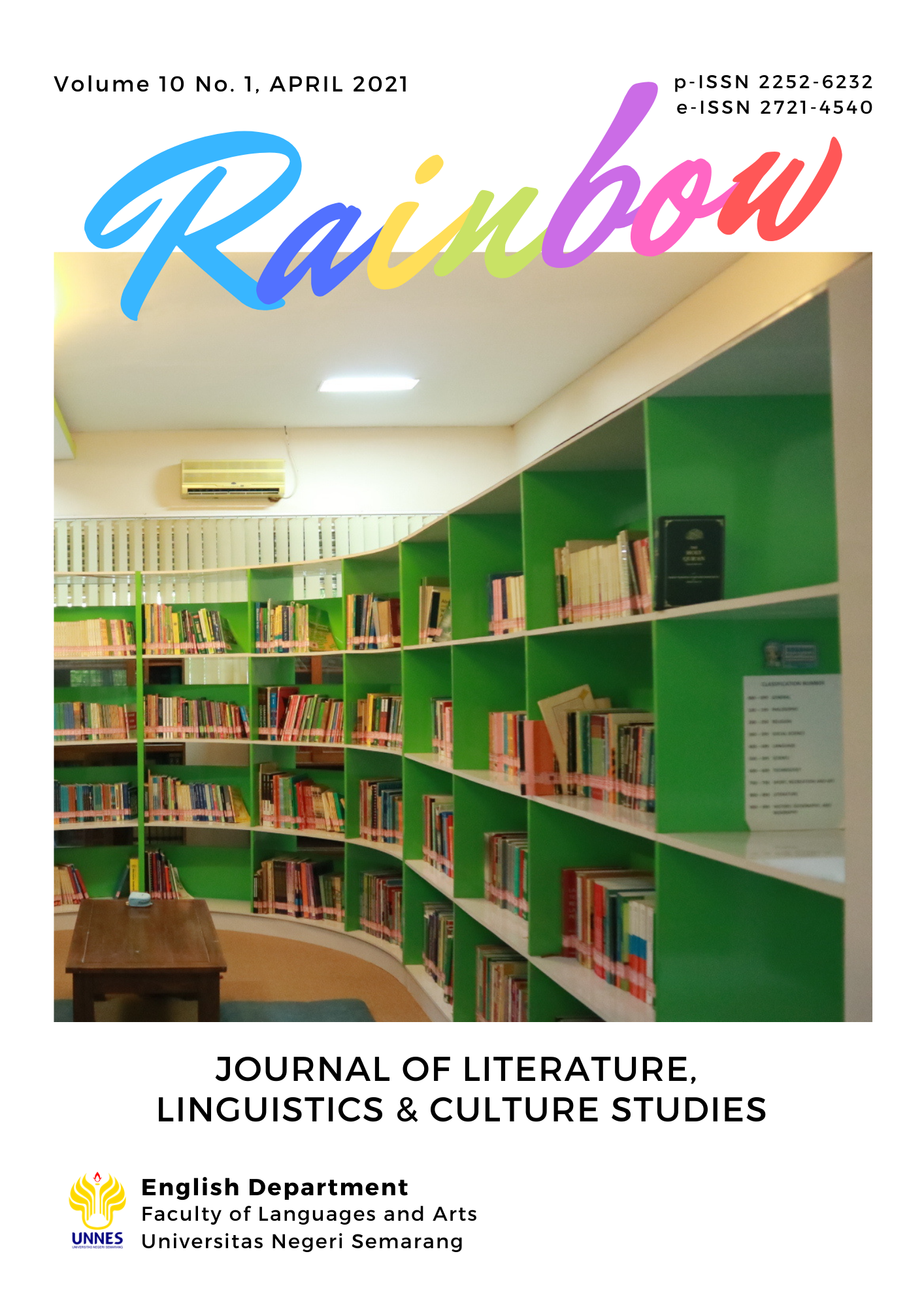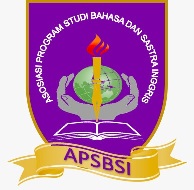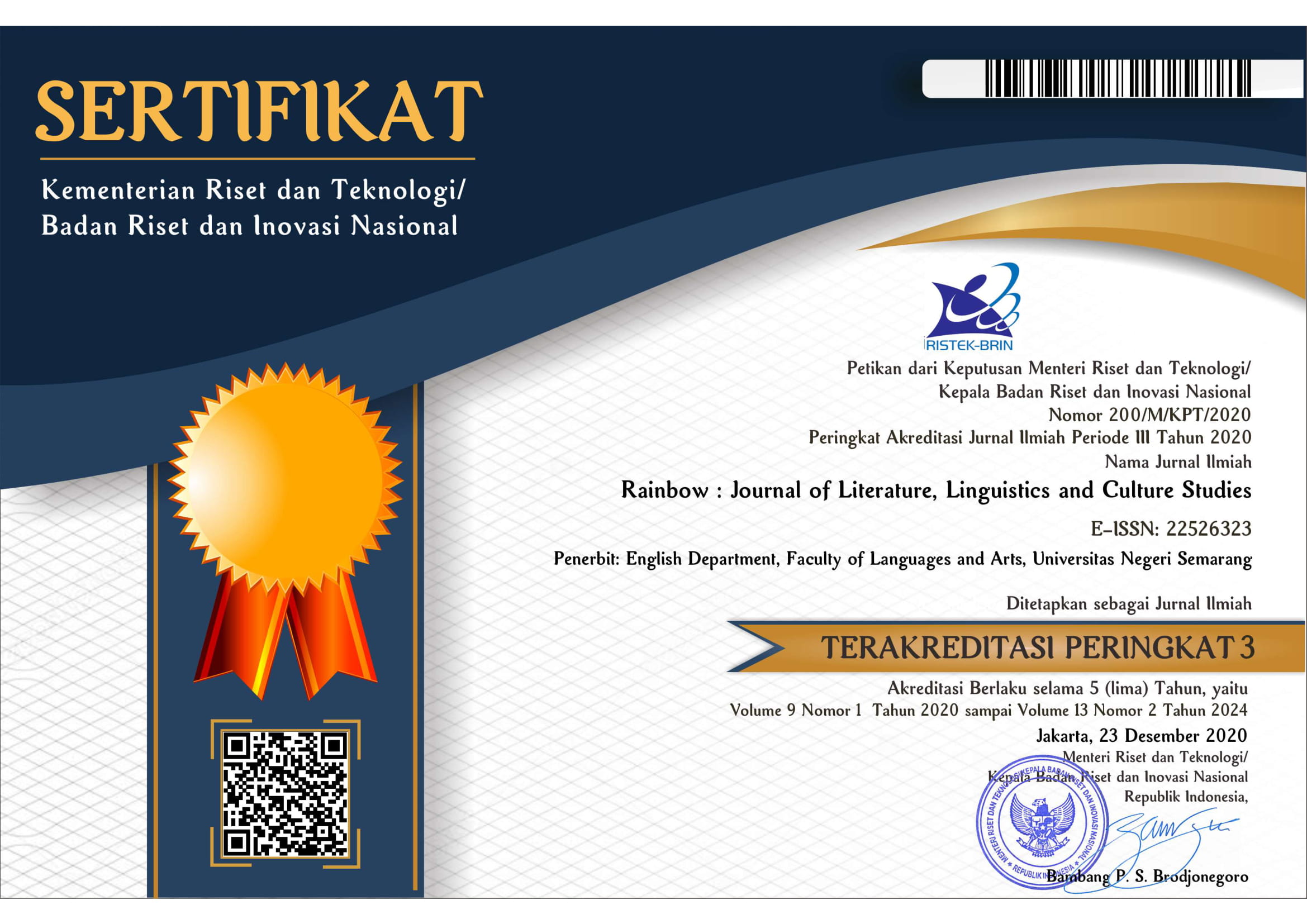Living in a hamster wheel: Identity construction through hopes and terrors in Bong Joon-Ho’s 'Parasite'
Abstract
Bong Joon-Ho’s Parasite (2019) has successfully depicted universal issues regarding class identity and social mobility. It tells us a story about a lower-class family, the Kims who aspired and struggled in their journey of climbing the social ladder. This research aims to explore the process of identity construction of the Kims. Close textual analysis is employed as a tool for investigation and Althusser’s ideological interpellation is used to explain the process. The research also focuses on the socio-cultural factors that influence the Kims’ social mobility which contribute to the permanence of their class identity. The findings found out that many symbolic markers such as differences in property, neighborhood, education, diet and behavior distinguish the lower- and upper-class families. Thus, interpellation occurs when the family is lured into believing the ‘American dream’: by working hard enough and taking more risks, it is possible to climb up the social hierarchy. It constructs their identity as a lower-class with aspirations to move upward. This study also concludes that the persistence of social immobility is highly influenced by the level of education, perceptual discrimination, the impossibility of cross-class marriage and the economic inequality. Therefore, it proves that class identity can be unfavorable inheritance.
References
Aries, E., & Seider, M. (2007). The role of social class in the formation of identity: A study of public and elite private college students. Journal of Social Psychology, 147(2), 137–157. https://doi.org/10.3200/SOCP.147.2.137-157
Avenburg, K. (2012). Interpellation and performance: The construction of identities through musical experience in the Virgen del Rosario fiesta in Iruya, Argentina. Latin American Perspectives, 39(2), 134–149. https://doi.org/10.1177/0094582X11427882
Bong, J. H. (Director). (2019). Parasite. [Film]. Barunson E&A.
Eidlin, B. (2014). Class formation and class identity: Birth, death, and possibilities for renewal. Sociology Compass, 8(8), 1045–1062. https://doi.org/10.1111/soc4.12197
Gabilondo, J. (2020). Bong Joon Ho’s Parasite and post-2008 Revolts : From the Discourse of the Master to the Destituent Power of the Real. International Journal of Zizek Studies, 14(1), 1–21.
Garcia, I. (2018). Symbolism, Collective Identity, and Community Development. Societies, 8(3), 81. https://doi.org/10.3390/soc8030081
Hays, N. A. (2012). Social Climbing : A Contextual Approach to Understanding the Effects of Social Hierarchy on Individual Cognition and Behavior. UCLA Electronic Theses and Dissertations.
Kasiyarno, K. (2014). American Dream: the American Hegemonic Culture and Its Implications To the World. Jurnal Humaniora, 26(1), 22. http://journal.ugm.ac.id/jurnal-humaniora/article/view/4652
Kim, B. R. (2015). The English Fever in South Korea: Focusing on the Problem of Early English Education. Journal of Education & Social Policy, 2(2), 117–124. www.jespnet.com
Kraus, M. W., Piff, P. K., & Keltner, D. (2011). Social class as culture: The convergence of resources and rank in the social realm. Current Directions in Psychological Science, 20(4), 246–250. https://doi.org/10.1177/0963721411414654
Lacassagne, A., Nieguth, T., & Depelteau, F. (2011). Shrek in the Classroom. In Investigating Shrek: Power, Identity and Ideology (First, pp. 1–183). Palgrave Macmillan. http://www.elsevier.com/locate/scp
Lee, H. Y., & Kim, J. (2012). Trends of income inequality in Korea. Communications in Computer and Information Science, 338 CCIS, 1–12. https://doi.org/10.1007/978-3-642-35251-5_1
Lee, S. T. (2021). Film as cultural diplomacy: South Korea’s nation branding through Parasite (2019). Place Branding and Public Diplomacy. https://doi.org/10.1057/s41254-020-00192-1
Lim, H. C., & Jang, J. H. (2006). Neo-liberalism in post-crisis South Korea: Social conditions and outcomes. Journal of Contemporary Asia, 36(4), 442–463. https://doi.org/10.1080/00472330680000281
Mani, D. (2019). Education in South Korea. World Education News + Reviews. https://wenr.wes.org/2018/10/education-in-south-korea
Manstead, A. S. R. (2018). The psychology of social class: How socioeconomic status impacts thought, feelings, and behaviour. British Journal of Social Psychology, 57(2), 267–291. https://doi.org/10.1111/bjso.12251
Nunn, A., Johnson, Steve, T., & Kelsey, S. (2007). Factors Influencing Social Mobility Original Citation. January. http://eprints.hud.ac.uk/
Ridgeway-Diaz, J., Truong, T. T., & Gabbard, G. O. (2020). Return of the Repressed: Bong Joon-Ho’s Parasite. Academic Psychiatry, 44(6), 792–794. https://doi.org/10.1007/s40596-020-01309-7
Robinson, J. (1994). Social Status and Academic Success in South Korea. Comparative Education Review, 38(4), 506–530. https://doi.org/10.1086/447273
Sadjadi, B., & Ahmadirad, A. (2017). Subjectivity and Ideological Interpellation: An Althusserian Reading of Bozorg Alavi’s Her Eyes. International Journal of Applied Linguistics and English Literature, 7(1), 203. https://doi.org/10.7575/aiac.ijalel.v.7n.1p.203
Shin, K. Y. (2013). Economic Crisis, Neoliberal Reforms, and the Rise of Precarious Work in South Korea. American Behavioral Scientist, 57(3), 335–353. https://doi.org/10.1177/0002764212466241
Stocchetti, M. (2019). Selfie and interpellation - A preliminary study of the role of ideology in the social construction of reality, self and society in the digital age. Kome, 8(1), 44–57. https://doi.org/10.17646/KOME.75672.37
Webb, F. R. (2014). The Role of Social Class Identity: Implications for African American and White College Students’ Psychological and Academic Outcomes. University of Michigan 2014, 1–205. https://deepblue.lib.umich.edu/bitstream/handle/2027.42/107174/frwebb_1.pdf?sequence=1
Woodward, K. (1997). Concepts of Identity and Difference. In Identity and Difference (pp. 1–350). Sage Publications, Inc. https://doi.org/10.7312/columbia/9780231178280.003.0003







